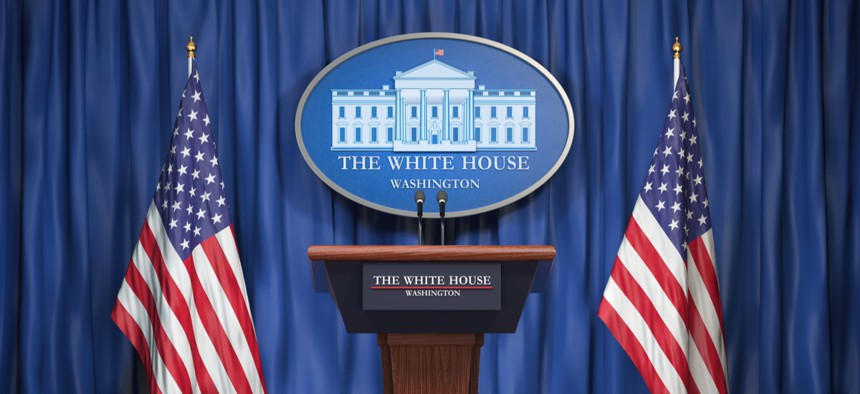Presidential Advisers Push for National Network to Support Quantum and AI Advancement

Maxx-Studio/Shutterstock.com
As with the High Performance Computing initiative in the past, industry and academic advisers told the administration they need facilities and a network to get from bits to neurons and qubits.
The President’s Council of Advisors on Science and Technology, or PCAST—reconstituted by executive order in October—held its first working meeting Monday, outlining its near-term focus on quantum computing and artificial intelligence as the prime industries of the future.
The body—first established by then-President George W. Bush in 2001 and recommissioned by each president since—brings together scientific researchers from industry and academia to advise the administration on national priorities.
“The PCAST helps the government understand what it can be doing to effectively maintain and ensure American leadership in AI, quantum and so on. But the other thing is how can the government partner with private sector, with nonprofits, with academic institutions?” council Chair Kelvin Droegemeier, director of the White House Office of Science and Technology Policy, told Nextgov.
“We really want to focus on taking actions that can move the needle on policy,” he said during opening remarks at the start of Monday’s meeting. “We’re not going to write long, lengthy reports. We’re going to mine your best ideas and your best thoughts, and then bring them forward in actionable ways in which we can implement policy that gives us tangible results and demonstrable progress.”
That work begins with a focus on five “industries of the future” in which American dominance will play a key role in the economic stability and national security of the country: quantum information science; artificial intelligence; wireless communications, including 5G; biotechnology; and advanced manufacturing. To achieve that end, the council established the Subcommittee on American Action Plan for Global Leadership in Industries of the Future, which presented its first report Monday.
As the committee begins its work, its members suggested narrowing the initial focus to AI and quantum, as “these were considered the highest priority,” according to Subcommittee Chair Dario Gil, director of IBM Research.
The subcommittee offered a set of recommendations for the federal government to assist these efforts.
“For instance, creating a national network of quantum computing user facilities. This would jumpstart quantum algorithm and application development and quantum computer science; make a critical scientific and computational resource available to scientists at U.S. national laboratories and universities; and serve as a market-making catalyst for accelerated growth in the U.S. industry producing quantum hardware and software.”
The framework for these facilities would be based on the High Performance Computing, or HPC, user facilities established at the national labs, which offers researchers access to supercomputers.
“These supported missions critical to our national security, advanced science and industry using novel approaches to computational modeling and simulation,” Gil said. “The benefits have been deep and broad-based.”
In the same vein, the subcommittee suggested the government invest in a secure quantum network—a quantum internet—through which this research could grow.
“Akin to the creation of ARPAnet in decades past—ultimately leading to the internet we have today—we should accelerate efforts to advance the science and infrastructure required to create a national quantum communications network, the foundation of future quantum internet,” Gil said.
That network would provide a common infrastructure for researchers across the country to collaborate.
Droegemeier jumped on the idea during the meeting, noting the establishment of user facilities and research networks is something the government is well-positioned to accomplish.
“If you look at the way NSFnet and the [National Science Foundation] centers changed the science landscape in this country, it was nothing short of amazing,” he said. “It’s eminently doable.”
The subcommittee also recommended the council—and the administration—maintain a strong focus on AI technologies, which Gil said are “essential for the nation.”
The subcommittee suggested the administration create “moonshot” targets for the national labs and ramp up training and hiring of skilled AI developers and practitioners.
Gil noted the U.S. lags behind Europe in the number of government-issued publications on AI research, though American industry is outpacing both.
While the first report delves into each technology separately, Gil said the subject of the next report will focus on how these intersect.
“Here’s our thesis: Science is a national treasure. And the security and prosperity of our nation depends on our ability to discover and create the new,” he said. “Simply put, the wellbeing of our nation depends on the rate at which our scientists and engineers discover; much in the same way that the rate of our economic growth is dependent on the rate of productivity of our workforce.”
“We have strong evidence that we’re about to enter an age of accelerated discovery powered by a revolution in computing,” Gil continued. “We marvel about what our computers can do today, but we haven’t fully grasped the ramifications of what will happen when we bring together the best of bit-based classical computing technologies, neuron-based AI systems and qubit-based quantum computers.”
The federal government’s role in all this will be providing the infrastructure that will allow research advancement to happen.
“What can the federal government provide to the R&D ecosystem of the United States that the other pieces of the puzzle cannot?” U.S. Chief Technology Officer Michael Kratsios said during the meeting. “What is the federal government’s value-add? … We can provide that initial backbone to drive all of it.”
Along with an updated focus, Droegemeier pointed out another novel difference for the new PCAST.
“The thing that we’re doing differently that’s never been done before is we have liaisons from the National Science Board on our subcommittees and we’re doing a joint meeting with the Science Board … which is the first time this has ever been done,” he told Nextgov, referencing the presidentially-appointed body that oversees the work of the National Science Foundation.
The first-ever joint meeting of PCAST and the National Science Board will take place Tuesday.






